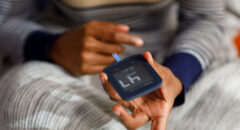
We tend to take warning signs in our everyday lives for granted. Car horns and fire alarms can feel like noisy nuisances more times than not, but they save lives.
Being diagnosed with prediabetes is like that car horn that keeps you from colliding into another car.
Prediabetes is a condition where your blood sugar level is higher than normal but not yet high enough to be type 2 diabetes.
According to the Centers for Disease Control and Prevention, one in three Americans has prediabetes, but 90% of people don’t know they have it.
Prediabetes is not a diabetes diagnosis. Instead, it indicates that you’re on the path to developing type 2 diabetes. You can think of it as a signal that it’s time to up your prevention game.
Here’s what you need to knowabout prediabetes.
* You’re at higher risk for developing prediabetes if you:
- Are overweight
- Are 45 or older
- Have had gestational diabetes
- Gave birth to a baby that weighs more than 9 pounds
- Having a parent or sibling with diabetes
- Have polycystic ovary syndrome
- Are physically active fewer than 3 times a week
Unsure of your risk? Take this quiz.
*More than half of people with prediabetes go on to develop full-blown diabetes, but it is possible to stop prediabetes from developing into type 2 diabetes.
*If you have prediabetes and don’t make any lifestyle changes, it will most likely develop into type 2 diabetes.
*Prediabetes can go undetected for years with no symptoms. Meaning, if you’re at higher risk you need to talk to your doctor about getting your blood sugar tested.
*Symptoms that indicate prediabetes has progressed to type 2 diabetes include frequent urination, increased thirst, blurred vision, and fatigue.
*Regular exercise–such as walking for 30 minutes a day, 5 days a week–can reduce your risk for developing type 2 diabetes.
*If you do have prediabetes thereare scientifically-proven programs to help you prevent or delay type 2 diabetes.
Diabetes is no joke. It’s the 5th leading cause of death among African Americans and severely impacts quality of life, meaning that prediabetes is an issue we can’t afford to ignore.

Jasmine Berry, B.A. in Journalism is a graduate of Hampton University and is soon to have her master of public health from Tulane University. She loves all things mental wellness and a good cup of tea.








